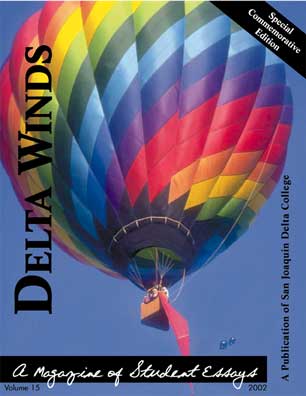Happiness
 Delta Winds: A Magazine of Student Essays
Delta Winds: A Magazine of Student Essays
A Publication of San Joaquin Delta College
2002
Happiness
Tiiu Newlin
If you think about being healthy, wealthy and wise, what would you like more? Moreover, what does it all bring? Someone once said, "The best things in life are free." Others would have you believe that life is a game, the one that has accumulated the most at the end of the game wins. I believe that the really best things in life -- happiness and all that it brings -- are free and cannot be purchased.
First, we must understand the difference between pleasure and happiness. Although people believe that you can purchase happiness, it is really pleasure that they buy. Money is a medium of exchange by economists. When we go to McDonald's to get a hamburger, we need money. By rules of economy, we get money for an exchange of the work we do or services we give. In return, money gives us the possibility to get stuff or do stuff. These things may bring pleasure, but pleasure is not happiness. Therefore, we can purchase opportunities and material things that bring about pleasurable experiences, but happiness is something more than this.
What is happiness and all that it brings? Happiness is both a state of mind and a way of life. Some would call it a spiritual journey; others may refer to it as a balance of nature. I have even heard someone say that happiness comes when you find yourself. These are all things that money cannot purchase. I have heard of many people being accused of buying their way into heaven. We can usually tell when someone is happy or unhappy. Happy people are good to be around and bring a sense of security and benefit to the relationship. These are the best things in life, and they cannot be purchased with money.
If you could buy happiness, then you would expect wealthy people to be very happy. There are many examples of wealthy people who we would expect to be happy but are not. Life seemed to give everything money could buy for the young Bay Area man John Walker, but he ended up fighting among terrorist forces in Afghanistan against the progressive world. He comes from a wealthy family, but the "wealth" probably did not make him happy. In his search for happiness, he gave up his wealth, family and country, and made statements that indicated he was happy with being near death in a fortress fighting alongside our enemy.
Other examples come from stories and parables. "Happiness" or "happy ever after" are the words that I most vividly remember from childhood fairytales. Most fairytales begin that once upon a time, there lived a rich king or queen but he or she was lonely and not happy. However, nearby in the countryside in a poor neighborhood a young woman or man with many friends lived very happily. Through these stories we understand that happiness is something that you find; we learn something about the people -- who they are, how they see themselves, and how they live their lives.
So you can see many people try to find happiness through pleasurable things, and because you can barter for these pleasurable experiences through various means, people think that they can purchase happiness. The possibilities that come through wealth may bring pleasure, but pleasure is not happiness. Happiness is a journey that encompasses both a state of mind and a way of life. Out of this journey comes all the things that money cannot purchase - the best things in life.






